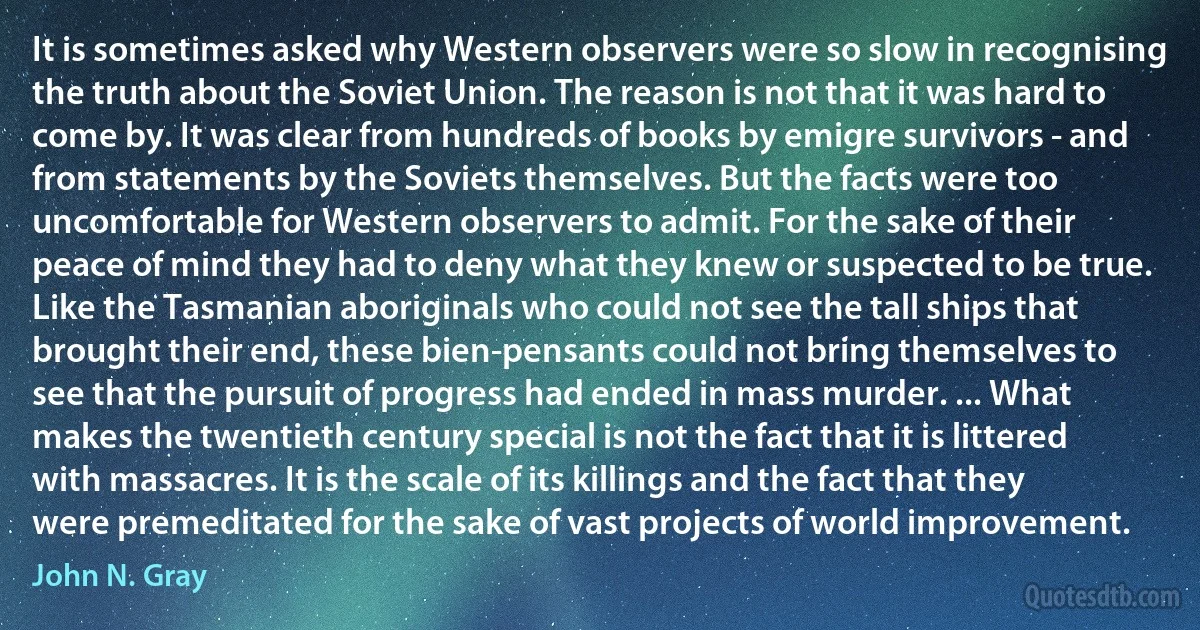
It is sometimes asked why Western observers were so slow in recognising the truth about the Soviet Union. The reason is not that it was hard to come by. It was clear from hundreds of books by emigre survivors - and from statements by the Soviets themselves. But the facts were too uncomfortable for Western observers to admit. For the sake of their peace of mind they had to deny what they knew or suspected to be true. Like the Tasmanian aboriginals who could not see the tall ships that brought their end, these bien-pensants could not bring themselves to see that the pursuit of progress had ended in mass murder. ... What makes the twentieth century special is not the fact that it is littered with massacres. It is the scale of its killings and the fact that they were premeditated for the sake of vast projects of world improvement.
John N. GrayRelated topics
century clear end hard improvement mass mind peace reason sake see slow tall truth vast western world facts projects SovietsRelated quotes
The ill-success of the projects of misdirected ingenuity has very naturally the effect of driving those men of practical skill, who, though without scientific knowledge, possess prudence and common sense, to the opposite extreme of caution, and of inducing them to avoid all experiments, and to confine themselves to the careful copying of successful existing structures and machines; a course which, although it avoids risk, would, if generally followed, stop the progress of all improvement. A similar course has sometimes... been adopted by men possessed of scientific as well as practical skill: such men having, in certain cases, from deference to popular prejudice, or from a dread of being reputed us theorists, considered it advisable to adopt the worse and customary design for a work in preference to a better but unusual design.

William John Macquorn Rankine
"Soviet Union is under dictatorship of the proletariat, the intelligentsia class is going to be starved to death."...a well known reporter had so warned me. Yes, I am afraid I might lost some sleep. But then, dictatorship of the proletariat(at present), isn't it for the forth coming of the classless society? As long as you do not murder it, naturally it's success will arrive soon, the elimination of classes will arrive soon, then no one will be "starved to death"...But now, the imperialists and their running dogs, still trying to tell us the Soviet Union's shortcomings, as if they really wish that Soviet Union would become heaven overnight, and all of it's people would enjoy life. Now, it turns out to be like that, it (imperialist) is disappointed, and feel uneasy...This is really the tears of the devil.

Lu Xun
They [mathematicians] only take those things into consideration, of which they have clear and distinct ideas, designating them by proper, adequate, and invariable names, and premising only a few axioms which are most noted and certain to investigate their affections and draw conclusions from them, and agreeably laying down a very few hypotheses, such as are in the highest degree consonant with reason and not to be denied by anyone in his right mind. In like manner they assign generations or causes easy to be understood and readily admitted by all, they preserve a most accurate order, every proposition immediately following from what is supposed and proved before, and reject all things howsoever specious and probable which can not be inferred and deduced after the same manner.-Barrow, Isaac.

Isaac Barrow
The right hon. Gentleman should be aware that, two weeks ago, I had an interesting meeting with an environmental campaigning group from the Soviet Union who openly admitted that the industrial policies followed in the past by the Soviet Union and many countries in central and eastern Europe had done a great deal of environmental damage. The difference is that those people felt that they had the power to change the policies to stop the destruction of their own environment. The policies of free-market economies which the right hon. Gentleman propounds have led to the pollution of the North sea and the Irish sea, the destruction of the rain forests in Brazil and Malaysia and long-term serious environmental damage by multinational companies all over the southern countries of this planet.

Jeremy Corbyn
Among the most viable of all economic delusions is the belief that machines on net balance create unemployment. Destroyed a thousand times, it has risen a thousand times out of its own ashes as hardy and vigorous as ever. Whenever there is long-continued mass unemployment, machines get the blame anew. This fallacy is still the basis of many labor union practices. The public tolerates these practices because it either believes at bottom that the unions are right, or is too confused to see just why they are wrong. The belief that machines cause unemployment, when held with any logical consistency, leads to preposterous conclusions. Not only must we be causing unemployment with every technological improvement we make today, but primitive man must have started causing it with the first efforts he made to save himself from needless toil and sweat.

Henry Hazlitt
